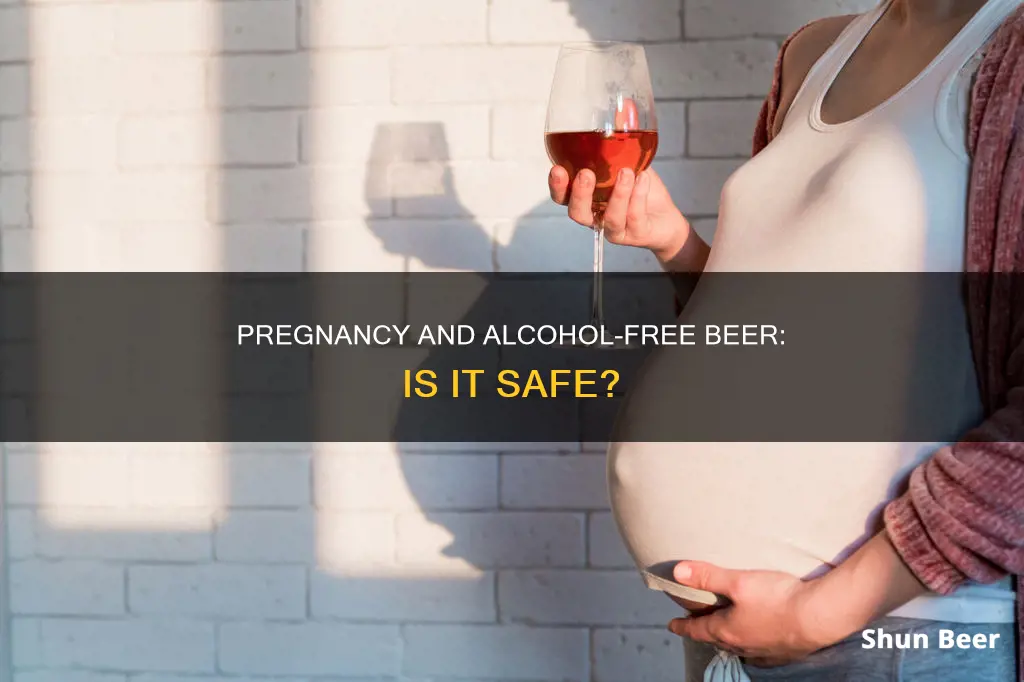
Drinking alcohol during pregnancy is a no-go, but what about non-alcoholic beer? These drinks are becoming increasingly popular, but can you have them while pregnant? Non-alcoholic beer might be a tempting option, but it's important to note that these drinks can still contain up to 0.5% alcohol by volume. While there is limited research on the effects of non-alcoholic beer during pregnancy, the general consensus is that no amount of alcohol is considered safe. However, some experts say that the trace amounts of alcohol in non-alcoholic beer are similar to what pregnant women may consume in fresh fruits and juices. Ultimately, the decision to drink non-alcoholic beer during pregnancy is a personal one and should be made in consultation with a healthcare provider.
| Characteristics | Values |
|---|---|
| Can I drink 0% alcohol beer when pregnant? | There is limited research on the safety of drinking non-alcoholic beer during pregnancy. The American College of Obstetrics and Gynecology (ACOG) and the FDA say that no amount of alcohol during pregnancy is considered safe. However, the CDC notes that moderate alcohol consumption (up to one drink a day) by a breastfeeding parent is not known to be harmful to the baby. |
| Amount of alcohol in non-alcoholic beer | Non-alcoholic beer can contain up to 0.5% alcohol by volume (ABV) and still be legally considered non-alcoholic. However, some non-alcoholic beers may contain more or less than this amount, and there is a chance the drinks contain more alcohol than advertised. |
| Risks of drinking non-alcoholic beer during pregnancy | There is a risk of fetal alcohol spectrum disorder (FASD) and other birth defects and developmental issues. |
| Alternatives to non-alcoholic beer during pregnancy | Alcohol-free drinks that contain zero detectable alcohol, such as mocktails made with fruit juice or soda water. |
What You'll Learn

Non-alcoholic beer might contain alcohol
It is important to note that non-alcoholic beer is not completely devoid of alcohol. In fact, by law, non-alcoholic beers can contain up to 0.5% alcohol by volume (ABV). This means that even if a drink is labelled as non-alcoholic, it can still contain a small amount of alcohol. This is an important consideration for pregnant women, as even small amounts of alcohol during pregnancy can be harmful to the developing fetus.
The reason non-alcoholic beers can contain alcohol is due to the way they are made. Non-alcoholic beer is typically produced by removing the alcohol from regular alcoholic beer. This can be done through methods such as heating the beer or using a fine filter to strain out the alcohol. However, these processes may not remove all of the alcohol, resulting in trace amounts remaining in the final product. Additionally, some non-alcoholic beers are made by simply reducing the amount of alcohol during the brewing process, rather than removing it completely.
Research has found that many non-alcoholic beers contain more alcohol than their labels indicate. For example, a study of 45 beverages claiming to have no or low alcohol content found that 29% of them had higher alcohol levels than stated on the label. Six beverages marketed as having 0% alcohol were found to have alcohol levels of more than 1%, with some even reaching 1.8%. This discrepancy between the labelled ABV and the actual ABV is concerning, especially for pregnant women who are trying to avoid alcohol consumption.
The effects of alcohol on fetal development are well-documented. The American College of Obstetrics and Gynecology (ACOG) states that there is no safe amount of alcohol during pregnancy and recommends complete abstinence to eliminate the risk of fetal alcohol spectrum disorder (FASD). FASD is an umbrella term for a range of problems that can occur when a child is exposed to alcohol in the womb, including physical abnormalities, growth retardation, and neurodevelopmental disorders. As there is no known safe threshold for alcohol intake during pregnancy, it is crucial for pregnant women to avoid non-alcoholic beers, as they may still contain trace amounts of alcohol.
While the trace amounts of alcohol in non-alcoholic beer may be comparable to the naturally occurring alcohol found in some foods and drinks, such as ripe bananas and apple juice, the potential risks associated with alcohol consumption during pregnancy are too great to ignore. Therefore, pregnant women should refrain from consuming non-alcoholic beers and opt for truly alcohol-free alternatives to eliminate any potential risks to their unborn child.
Drinking Beer in Marrakech: What's the Deal?
You may want to see also

The risks of drinking alcohol during pregnancy
Drinking alcohol during pregnancy can have serious health consequences for the baby. Alcohol is passed directly from the mother's body to the baby's, and can cause a range of issues known as fetal alcohol spectrum disorders (FASDs). These include low birth weight, developmental delays, behavioural problems, and health problems such as seizures, visual or hearing impairment, and neurodevelopmental disorders. There is also an increased risk of miscarriage, stillbirth, and fetal growth restriction associated with prenatal alcohol exposure.
The American College of Obstetrics and Gynecology (ACOG) states that no amount of alcohol during pregnancy is considered safe. This is because even small amounts of alcohol can lead to behavioural and learning difficulties, birth defects, and other risks. The ACOG's advice is supported by most national health organisations and clinicians, who recommend complete abstinence from alcohol during pregnancy.
The effects of low to moderate alcohol consumption during pregnancy are less clear, and broader studies are needed to investigate this further. However, as there is no known safe threshold for alcohol intake during pregnancy, and the effects can be severe, most experts advise that the safest approach is to avoid alcohol entirely.
It is important to note that the decision to drink alcohol during pregnancy is a personal one, and women should be allowed to make their own decisions based on the amount of risk they are willing to accept. It is always best to consult with a healthcare professional for individual advice.
Alka-Seltzer and Beer: A Safe Mix?
You may want to see also

The effects of drinking alcohol while pregnant
Drinking alcohol while pregnant can cause a range of health problems for the baby, collectively referred to as fetal alcohol spectrum disorders (FASD). These disorders can cause physical, cognitive, and behavioural complications, including growth retardation and serious neurodevelopmental disorders. The most severe form of FASD is fetal alcohol syndrome (FAS), which includes dysmorphic facial features, growth retardation, and neurodevelopmental disorders. People with FAS experience growth problems, central nervous system dysfunction, and facial malformations or anomalies.
The effects of drinking alcohol during pregnancy can also lead to premature labour, miscarriage, and stillbirth. Alcohol consumption during pregnancy has been linked to an increased risk of miscarriage, with each additional drink per week resulting in a 6% increase in miscarriage risk. Additionally, drinking alcohol while pregnant can cause a range of developmental, physical, mental, and emotional disabilities in the baby. These effects can manifest in several birth defects, including abnormal facial characteristics, small head circumference, below-average height and weight, problems with eyesight or hearing, and bone, heart, and kidney issues.
The American College of Obstetricians and Gynecologists, Centers for Disease Control (CDC), Surgeon General, and medical societies from other countries, including the Society of Obstetricians and Gynecologists of Canada and the U.K.’s National Health Service, all recommend complete abstinence from alcohol during pregnancy. This is because there is no known safe amount of alcohol consumption during pregnancy. Even low-level alcohol consumption at any stage of pregnancy can result in the baby developing FASDs.
While non-alcoholic beers are becoming a popular alternative for pregnant women, it is important to note that these drinks can still contain up to 0.5% alcohol by volume. Additionally, there may be higher levels of ethanol in non-alcoholic drinks than what is indicated on their labels. As there is no known safe level of alcohol intake during pregnancy, abstinence from non-alcoholic beverages is recommended to eliminate any risk of fetal alcohol spectrum disorder.
Beer Benefits: Should You Drink It or Skip It?
You may want to see also

What to drink when pregnant
Drinking enough fluids is crucial during pregnancy, as it helps support your baby's growth and development, aids digestion, and prevents common pregnancy discomforts. Here are some recommended drink options for pregnant women:
- Water: Water is the best way to stay hydrated, as it is calorie-free and helps flush out toxins. Aim for 8 to 10 glasses of water per day. If plain water seems unappealing, try infusing it with slices of citrus fruits, cucumbers, or fresh herbs.
- Milk: Milk is an excellent source of calcium and protein, crucial for your baby's bone and muscle development. If you're lactose intolerant, you can opt for lactose-free or plant-based milk alternatives like almond, soy, or oat milk.
- Ginger tea: Hot or iced ginger tea is a tasty option that may help soothe an unsettled stomach and ease pregnancy-related nausea.
- Sparkling water with citrus: If you're craving soda, sparkling water with a splash of citrus juice can be a great alternative. It provides the fizzy sensation without the excessive sugars and artificial additives.
- Fruit and vegetable juices: Freshly squeezed fruit juices like orange, pomegranate, or watermelon are packed with vitamins, minerals, and natural sugars. Vegetable juices like carrot or spinach juice are rich in antioxidants and vitamins. However, be sure to consume these in moderation due to their natural sugar content, and opt for homemade juices to avoid added preservatives.
- Smoothies: Smoothies are a great way to pack in various nutrients. Blend fruits, vegetables, Greek yogurt, and nuts for a delicious and nutrient-rich drink.
- Decaffeinated teas and coffee: If you enjoy tea or coffee, opt for decaffeinated versions to avoid the adverse effects of caffeine during pregnancy.
It is important to note that drinks labeled "non-alcoholic" can still contain up to 0.5% alcohol, and there is limited research on their safety during pregnancy. While some sources claim that non-alcoholic beer is safe, as the trace amounts of alcohol are similar to those found in some fruits and juices, others recommend abstaining from these drinks to eliminate any risk of fetal alcohol spectrum disorder. Always consult your healthcare provider for personalized recommendations.
Lip Piercing and Beer: What You Need to Know
You may want to see also

The difference between non-alcoholic and alcohol-free drinks
The terms "non-alcoholic" and "alcohol-free" are often used interchangeably, but they have distinct meanings and regulations surrounding their use. Understanding these differences is crucial, especially for those with specific health, religious, or personal needs.
Non-Alcoholic Drinks
In the UK, "non-alcoholic" drinks are defined as containing up to 0.05% alcohol by volume (ABV). This definition includes beverages that naturally contain trace amounts of alcohol due to natural fermentation, such as fruit juices. While the UK's Department of Health & Social Care suggests that the term "non-alcoholic" should not be used with names typically associated with alcoholic drinks, many brands still combine these terms on their labels, leading to potential confusion. For example, "non-alcoholic beer" may be seen on labels, even though it falls under the "alcohol-free" category.
Alcohol-Free Drinks
"Alcohol-free" drinks are legally defined as containing no more than 0.05% ABV in the UK. The Department of Health & Social Care recommends that alcohol should be removed from these drinks and that the label should be applied only when alcohol has been extracted. Additionally, they suggest including the ABV or stating that the drink contains no alcohol. However, this definition varies across countries. For instance, in Norway, alcohol-free drinks can have up to 0.7% ABV, while in the Netherlands and Spain, the limit is 0.1% ABV.
Low Alcohol Drinks
'Low Alcohol' drinks are legally defined in the UK as having an alcohol content lower than traditional alcoholic drinks but higher than non-alcoholic options. The Department of Health & Social Care suggests that low alcohol drinks should have an ABV of 1.2% or below, and this category is ideal for those who want a slight alcoholic buzz without the heavier effects of standard alcoholic drinks.
De-alcoholised Drinks
'De-alcoholised' drinks typically start as standard alcoholic beverages but then undergo a process to remove most of the alcohol. The result is a drink that retains the flavours and characteristics of its alcoholic version while having minimal alcohol content. The UK government suggests that the term "de-alcoholised" should be applied only when the alcohol has been extracted and the drink contains no more than 0.5% ABV.
Zero or 0.0% Drinks
Drinks labelled as "0.0%" or "zero alcohol" can be classified as both "non-alcoholic" and "alcohol-free." However, it's important to read the labels carefully, as some drinks with these labels may still contain up to 0.05% ABV.
Final Thoughts
The differences between "non-alcoholic" and "alcohol-free" drinks primarily lie in the percentage of alcohol by volume and the labelling regulations. While "non-alcoholic" drinks can contain up to 0.05% ABV, "alcohol-free" drinks are defined as having no more than 0.05% ABV in the UK. However, the definitions and thresholds vary across different countries, so it's always important to check the labels and understand the specific regulations in your region.
Ibuprofen and Beer: Is It Safe to Mix?
You may want to see also
Frequently asked questions
It is generally advised to avoid drinking any alcohol during pregnancy. However, the decision to drink non-alcoholic beer is a personal choice that should be made in consultation with a healthcare provider.
Alcohol consumption during pregnancy can lead to fetal alcohol spectrum disorders, including fetal alcohol syndrome, which can cause physical, cognitive, and behavioural complications in the baby. There is no known safe threshold for alcohol intake during pregnancy, so complete abstinence is recommended.
Yes, there are alcohol-free mocktails or drinks labelled "alcohol-free" that do not contain any traceable alcohol. These can be a good alternative to satisfy cravings during pregnancy.
It is important to read labels carefully and check for any ingredients that may be unsafe during pregnancy. Additionally, some non-alcoholic drinks may contain higher levels of alcohol than advertised, so it is advisable to opt for drinks labelled as "alcohol-free" to eliminate any risks.







